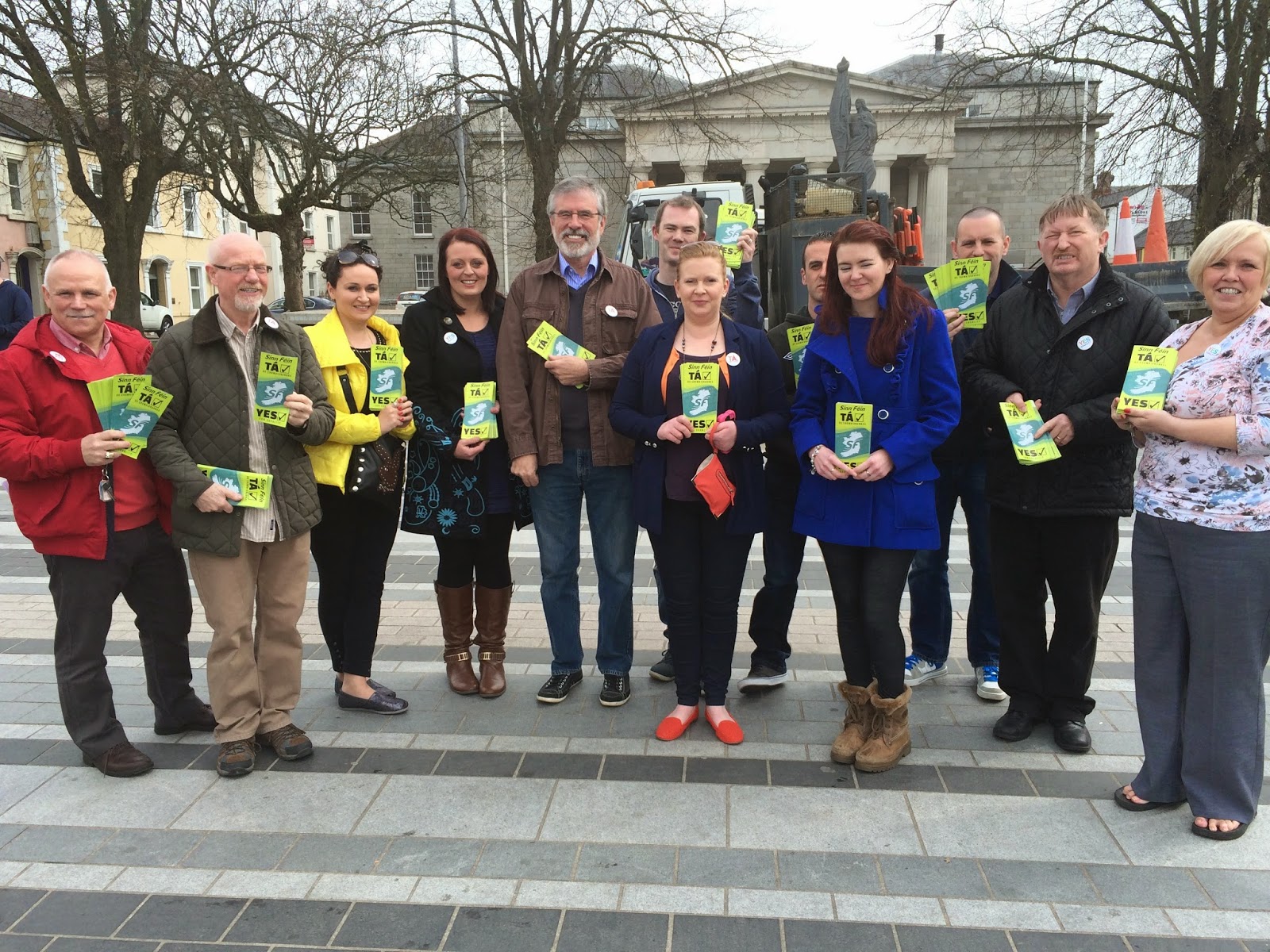Dublin Launch of Referendums Campaign
Two years ago this week the 100 members of the Constitutional
Convention, meeting in the Grand Hotel in Malahide in north Dublin, delivered a
decisive vote of 79% in favour of amending the Irish constitution to provide
for marriage equality. The three Sinn Féin delegates voted in favour of
amending the Constitution to include a positive obligation on the State to give
effect to a guarantee of marriage equality and to the equal rights of the children
of these marriages. It was described by advocacy groups as ‘an historic step’
and it was.
But like all such historic steps toward
ending discrimination in all its forms and building real equality into society,
there has to be a next step and a next step. In January the government finally
published the wording for the referendum on same-sex marriage.
In just five weeks’ time two referenda will be held. One is to
reduce the eligibility age for a candidate for the Presidential elections. The
second is on marriage equality. This referendum vote will decide whether the
proposed new wording should be added to the constitution: ‘Marriage may be contracted in accordance with law by two persons
without distinction as to their sex.’
Launch of Yes campaign in Louth
Early opinion
polls indicated that there was an overwhelming majority for a Yes vote. Last
December the polls indicated as many as 80% of voters would cast a Yes vote.
More recent trends have suggested a small decline in that. An Irish Times/Ipsos
MRBI poll at the end of March had the Yes side remaining relatively strong at
74%. However campaigners on both sides are very conscious of the volatility of
the electorate and the inaccuracy on occasion of polls.
In 2013
opinion polls indicated that the Yes side in the referendum to scrap the Seanad
would comfortably win with 62% of the vote. On referendum day however the proposal to
abolish the Seanad took only 48% of the vote losing by four per cent to the No
campaign.
So there can be no room for complacency in advance of May 22nd.
Sinn Féin is for a Yes vote. I would appeal to everyone to vote Yes and I would
especially urge Yes voters to become active campaigners for a Yes vote.
Many of us will have a member of our family or extended family who is
gay. All of us, whatever age we are or wherever we live or work, know someone
who is gay. They are our family, our friends, our workmates and our neighbours.
They are of all ages and from all walks of life. They want what we want – the
right to live their lives as full and contributing citizens and to share in the
love of a family of their own.
This month there has been a lot of focus on the Easter Rising. Sinn
Féin, the Irish government and many other individuals and organisations have
commemorated that historic event and have been setting out their plans for next
year’s centenary celebrations.
At the heart of the Easter Rising is the Proclamation of the Republic.
It is the founding document of modern Irish Republicanism and for me it is the
starting point for my approach to issues of human rights, injustice and
inequality.
The Proclamation declares that: ‘The Republic guarantees religious and civil liberty, equal rights and
equal opportunities to all its citizens, and declares its resolve to pursue the
happiness and prosperity of the whole nation and of all its parts, cherishing
all of the children of the nation equally …’
And there you have it. Irish republicans are
for equal rights and equal opportunities for all; we are resolved to pursue the
happiness of everyone in the nation; and to cherish all the children of the
nation equally. It does not say unless you are gay or bisexual or transgender. It
doesn’t say unless you are black or a traveller or a woman or a Catholic or a
Protestant. There are no exceptions. It doesn’t say whether you are disabled or
sick or old. It says ALL its citizens.
The Proclamation wants all of the children of the
island of Ireland to be cherished equally and to be happy.
Irish republicans want a society which is
inclusive and which respects our diversity. Nothing less can be tolerated in a
modern, progressive and inclusive society. A lot of progress has been made on
this in recent years. But much more is needed, including tackling the worsening
problem of race crime.
On May 22nd
there is an opportunity to take another historic step forward. I would urge
everyone to vote Yes. I would also appeal again for everyone to join the
campaign for a Yes Vote. If you feel you can’t become part of any of the formal
campaigns being organised then become part of the informal campaign.
Talk to your friends, to
your workmates, to your family and neighbours and ask them to vote Yes. Text
them. Facebook them. Use Twitter. Let’s get the biggest vote possible and
ensure that on May 22nd the marriage equality referendum is passed.

Canvassing in Dundalk

.jpg)





Comments